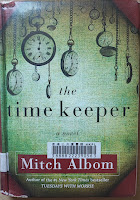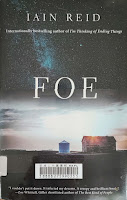Book Name : Homo Deus - A Brief History of Tomorrow
Author : Yuval Noah Harari
What is it about : A big book so a big review here. A book delving deeply in to the psyche and philosophy on the Found and Loss of Faith and Belief of Our Species, the Homo Sapiens; and postulating the concepts, ideas and practicalities of us becoming the Human God - Homo Deus, with the advent of bio-engineering and artificial intelligence as well as our experiences gained from different "Religions" over the years gone past. These "Religions" included not only Buddhism, Islam and Christianity and the likes, but also Communism, Capitalism, and Humanism. The Author describes Our Species' initial perceptions of those all-powerful Super Beings out there, bestowing on us the Meaning, to Our Species' own ascension in becoming that very Super Being ourselves as we gained that Power. The book then lay out how, we now find Meaning not from Religions, but firstly from within our Inner Selves, the Humanist, and yet looking further down the years, from "Algorithms".

The book paints an interesting if not down right scary future, when the two new dominating Techno-Religions will be firstly, Techno-Humanism which sees Homo Sapiens having run it's historical course and is no longer relevant in the future and technology should be used to create Homo Deus; and secondly, Data Religion, Dataism, which venerates neither gods nor man, it worships data. Alas, I have attached one page from the book which succinctly describes Dataism.
And like Religions of our present times, such as Christianity, Buddhism and Islam, both these new Techno-Religions, promise happiness, peace, prosperity and even eternal life.
Some thoughts after having read the book : In this book, the criss -crossing of the many themes of history, science and philosophy, the angles of arguments and perceptives of the Meaning of Life, the rich contents and up-to-date (2016) scientific information, the thought provoking debates of Consciousness and Intelligence, all instilled in me a sense of awe to what regards the future of Our Species - I sense Our Species free falling into an abyss of unknown - for the very first time, the trajectory of the future development of Our Species is truly uncertain. A great quote from this book - "our greatest scientific discovery was the discovery of ignorance".
Now that our World is more or less manageable with regards to food shortages, wars escalations and diseases control, all of which dealt a hard devastating hand in the sufferings of Our Species in the past, the Author pointed out our next big conquests - Immortality, Bliss and Divinity.
According to the Author, "Algorithm" is arguably the single most important concept in our world. Basically everything in our world can be thought of as being composed of Algorithms, our body, plants and animals, the cosmos, the economy, our political systems and of course mundane entities like the stock exchanges and the Internet.
Regarding our jobs in the future, some rather telling predictions, that is a future where Algorithms take over our duties, science, art and production - UNemployment rate for : telemarketers 99%, sports referees 97%, bus drivers 89% and construction workers 88%, but for archaeologists 0.7%, because there will be no commerical incentives to invest in automating this unprofitable job of being an archeologist.
Would I recommend this book to you : I initially thought 400 pages would be a hard slog ahead, but the book turns out to be highly amusing with witty glibs and insightful reflections on our own species' outstanding effort and achievements thus far in becoming almost the Human God but at the same time we are actually that laughable fall-guy who thinks we are oh-so-superior when actually we don't know a thing about who and what we really are. So I breezed through effortlessly this daunting big book. Be warned, this is a sit-down-and-contemplate book, not a good companion for that sunset cocktail by the pool.

























